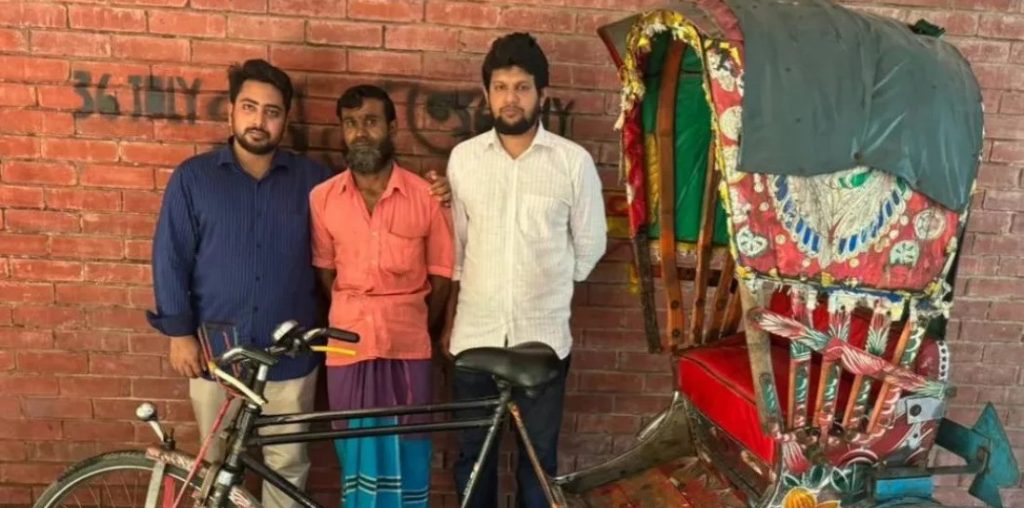Historic rickshaw that carried martyred student Golam Nafiz during the anti-discrimination movement is one such artifact, now destined for preservation at the July Revolution Memorial Museum. This decision represents more than just the conservation of a historical item – it embodies the nation’s commitment to remembering those who sacrificed everything for a more equitable society.
The Day That Changed Everything
On August 4, 2024, the bustling streets of Dhaka’s Farmgate area became the stage for a tragedy that would shake the nation’s conscience. Golam Nafiz, a bright and passionate student from Banani Bidyaniketan School and College, joined his fellow students in the anti-discrimination movement, carrying hopes for a better future. None could have predicted that this day would mark his final stand for justice.
The peaceful demonstration took a devastating turn when shots pierced the air. In a moment that would be forever seared into witnesses’ memories, Nafiz was brutally shot. The poignant image of his hands still gripping the rickshaw’s rod as police placed his wounded body on its footboard became a powerful symbol of both youth resistance and institutional violence.
The Unsung Hero: Nur Mohammad’s Story
Behind every historical moment, there are often ordinary citizens who rise to perform extraordinary acts of courage. Nur Mohammad, the rickshaw puller who became an unexpected hero that day, exemplifies this truth. When chaos erupted and others fled, Mohammad chose to act. With determination and bravery, he navigated his rickshaw through the tumultuous streets, racing against time to get the injured student to medical help.
Despite Mohammad’s valiant efforts, Nafiz would not survive his injuries. However, the rickshaw puller’s actions in those critical moments demonstrated the best of humanity – the instinct to help others even in the face of danger. His story serves as a reminder that heroism often comes from the most unexpected quarters.
From Streets to Headlines: The Rickshaw’s Journey
The story might have faded from public memory if not for the vigilant reporting of Prothom Alo. Their November 5 article revealed that this historically significant rickshaw had been sold by its owner, triggering immediate action from government officials. Md Nahid Islam, Adviser to the Ministry of Posts, Telecommunications and Information Technology, and the Ministry of Information and Broadcasting, recognized the importance of preserving this symbol of sacrifice.
What followed was a remarkable chain of events that highlighted the global connection of Bangladesh’s diaspora to their homeland. The rickshaw had been purchased for Tk 35,000 by Ahsanul Kabir Siddiqui Kaiser, a Bangladeshi living in London. Upon learning of the vehicle’s historical significance, Kaiser demonstrated remarkable patriotism and social consciousness by immediately offering to donate it for preservation.
A Ceremony of Recognition and Remembrance
The formal handover ceremony at Gonobhaban on Thursday marked more than just a transfer of ownership. It represented the nation’s commitment to preserving its history and honoring its heroes – both the martyred and the living. The rickshaw was officially entrusted to Mahfuj Alam, joint convener of the museum committee and special assistant to the Chief Adviser, ensuring its place in the nation’s historical narrative.
During this significant event, the government took steps to acknowledge the bravery of Nur Mohammad. Adviser Nahid Islam’s promise of financial assistance to the rickshaw puller reflects a broader understanding that heroes come in many forms, and their contributions deserve recognition and support.
The Legacy Lives On: More Than a Museum Piece
The preservation of this rickshaw at the July Revolution Memorial Museum serves multiple profound purposes. First, it stands as a tangible link to a crucial moment in Bangladesh’s ongoing struggle for social justice. For future generations, it will serve as a powerful educational tool, helping them understand the real cost of social change and the importance of standing up against discrimination.
The rickshaw’s transformation from a daily mode of transport to a museum artifact mirrors Bangladesh’s own journey – from struggle to remembrance, from pain to purpose. It reminds us that the objects we use in our daily lives can become powerful symbols when they intersect with moments of historical significance.
A Beacon for Future Generations
As visitors to the July Revolution Memorial Museum encounter this rickshaw in years to come, they will find more than just a preserved vehicle. They will discover a story of sacrifice, courage, and the ongoing struggle for equality. The rickshaw stands as a testament to Golam Nafiz’s ultimate sacrifice, Nur Mohammad’s spontaneous bravery, and the countless others who continue to fight for justice in Bangladesh.
This preservation effort ensures that future generations will have a tangible connection to this pivotal moment in their nation’s history. It serves as a reminder that the fight for justice and equality is often paid for in the most precious currency – the lives of those brave enough to stand up for what they believe in.
Moving Forward While Remembering
As Bangladesh continues its journey toward a more equitable society, the preserved rickshaw will serve as both a memorial and a call to action. It reminds us that the struggle for justice is ongoing, that ordinary people can become extraordinary heroes, and that remembering our past is crucial for shaping our future.
The rickshaw’s journey – from the streets of Dhaka to the halls of a museum – tells a story larger than itself. It speaks of a nation’s commitment to remembering its martyrs, honoring its heroes, and continuing the fight for the principles they held dear. In its new home at the July Revolution Memorial Museum, it will stand as an eternal witness to a moment when one student’s sacrifice and one rickshaw puller’s courage became part of Bangladesh’s enduring struggle for justice and equality.
Resources:
- https://www.dhakatribune.com/bangladesh/364518/rickshaw-carrying-body-of-shaheed-nafiz-to-be
- https://www.tbsnews.net/bangladesh/rickshaw-carrying-body-shaheed-nafiz-be-preserved-july-revolution-memorial-museum-987506
